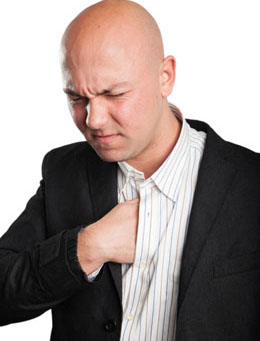There is a strong correlation between anxiety and chest tightness. It is usually not a serious issue, but causes a lot of discomfort. More details follow...

Chest tightness is a common symptom of a panic attack. However, those who do not have anxiety disorder can also experience anxiety and chest tightness together. It can happen to both men and women. However, it has been found that women are more prone to it. Anxiety related chest tightness is characterized by a twitching sensation in the chest, and is accompanied by pressure in the chest wall. Some people also complain about a sharp burning pain in the chest. The pain and tightness is not confined to the chest region only, and often get extended to the stomach, head, neck, and back. Other common symptoms that are observed in this condition are shortness of breath, numbness in hands, feet and face, excessive sweating, dizziness, etc.
Why Does Anxiety Cause Chest Tightness?
The anxiety feeling is triggered by excessive mental stress. Under the influence of stress, the brain fails to make proper judgment. It wrongly assumes that there is some kind of threat to the person's life. As a result, it triggers a number of reactions like excess release of the adrenalin hormone, so that the body can withstand the threat and fight off the unseen danger. In this condition, a number of physical changes occur in the body. One such change is a faster heartbeat. As a result, the individual feels tightness in the chest.
Anxiety tends to increase the production of stomach acids. If this excess acid flows back into the esophagus, then it irritates the lining of the esophagus and causes heartburn. During this time, one may get the sense of tightness and fullness in the chest. This kind of chest tightness is mostly felt after having meals, and it worsens when one lies on the back.
Sometimes, too much of anxiety can lead to abnormal contraction of the muscles of various parts of the body. When the chest muscles get tensed up for this reason, then one can feel tightness. Usually, this kind of intense tight feeling in the chest lasts only for a few seconds. However, if there is too much of tension in the chest muscles, then one may experience it as a constant dull chest pain.
How to Relieve Chest Tightness Caused by Anxiety?
You must have noticed that anxiety induced chest tightness comes along with breathing difficulty. Therefore, if you normalize the breathing, then you can get relief from the tightness to a great extent. For this, first of all, inhale normally and then exhale at a very slow pace. Once you have exhaled completely, hold your breath for 2 - 3 seconds. Then breathe in normally one more time. Now, while exhaling, slightly bend forward and release the air all of a sudden. After that, keep breathing normally. Thus, you will be relieved from the shortness of breath, and you can feel the palpitations and chest tightness also disappear.
How to Treat Anxiety and Chest Tightness?
If you experience chest tightness due to anxiety quite frequently, then you need medical treatment. This condition is treated with the help of medicines and therapy. Antidepressants and anxiolytics are prescribed for controlling the physical symptoms of anxiety. Medicines are also given to induce sleep. Those who have developed a problem of acid reflux or gastroesophageal reflux disease are given suitable medicines for controlling stomach acids.
Then, cognitive behavioral therapy is recommended, so that one can deal with anxiety in a better manner. Here, therapists work with the patient to identify the underlying causes that trigger fearful thinking. Then, they help the patients develop coping skills so that they can manage the fear and anxiety. Patients are also advised to learn relaxation techniques like yoga and meditation for stress management. Exercising is another excellent cure for anxiety. Activities like brisk walking, jogging, swimming, or any other aerobic exercises uses up the excess adrenaline hormone released by the brain.
The intensity of chest tightness increases when there is a rise in the anxiety level. Therefore, the next time you face this problem, try to reduce the underlying anxiety, and you can easily get rid of the tight feeling in the chest.


 Chest tightness is a common symptom of a panic attack. However, those who do not have anxiety disorder can also experience anxiety and chest tightness together. It can happen to both men and women. However, it has been found that women are more prone to it. Anxiety related chest tightness is characterized by a twitching sensation in the chest, and is accompanied by pressure in the chest wall. Some people also complain about a sharp burning pain in the chest. The pain and tightness is not confined to the chest region only, and often get extended to the stomach, head, neck, and back. Other common symptoms that are observed in this condition are shortness of breath, numbness in hands, feet and face, excessive sweating, dizziness, etc.
Chest tightness is a common symptom of a panic attack. However, those who do not have anxiety disorder can also experience anxiety and chest tightness together. It can happen to both men and women. However, it has been found that women are more prone to it. Anxiety related chest tightness is characterized by a twitching sensation in the chest, and is accompanied by pressure in the chest wall. Some people also complain about a sharp burning pain in the chest. The pain and tightness is not confined to the chest region only, and often get extended to the stomach, head, neck, and back. Other common symptoms that are observed in this condition are shortness of breath, numbness in hands, feet and face, excessive sweating, dizziness, etc.